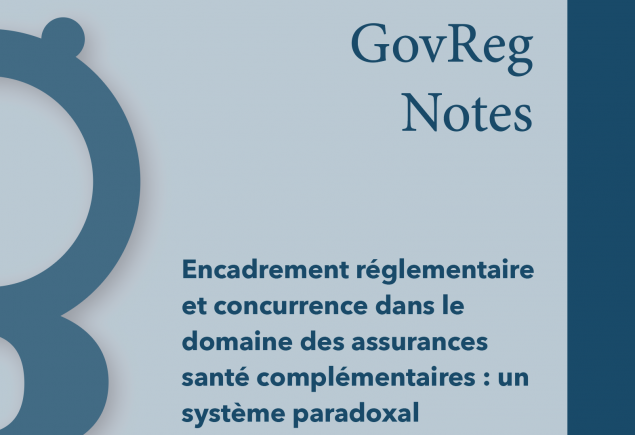
|
| , - |
|
|
The "Regard d'Expert" debate on the note "Regulatory framework and competition in supplementary health insurance: a paradoxical system".
On 18 November 2021, the Chair organised a debate in a short format (30 min), at which an expert in the field shared her comments on the GovReg Note with the authors.
- Eric Brousseau | Directeur scientifique de la Chaire Gouvernance et Régulation, co-auteur de la note et modérateur du débat
- Joëlle Toledano | Professeure émérite, associée à Chaire Gouvernance et Régulation, Membre du Conseil National du Numérique (CNNUM), co-autrice de la note
- Alexandre Volle | Maître de Conférences, Université de Pau, co-auteur de la note
- Josette Guéniau | Associée fondatrice du cabinet de conseil JGSC, Directrice de l’Observatoire Santé et Innovation de l’Institut Sapiens ; experte discutant la note
Abstract
This note analyses the institutional framework and competition between players in the sector of what is commonly referred to as "mutual health insurance", a misleading term if ever there was one, since the players in supplementary health insurance (AMC) are far from systematically mutual operators. Although "mutuals" have historically been involved in covering health risks, they are not the only ones. Other players, in particular provident institutions (IP), have also historically been involved in this sector, as health risk is linked to other risks (loss of earnings, disability, death). In the more recent past, insurance companies have also taken an interest in this sector.
The economics of the AMC sector, the quality of the service provided to users and the community, and the competition between different players, cannot therefore be analysed without understanding the historical roots of a system in which players with different rationales - and regulatory constraints - coexist. These rationales partly conflict with each other, and the current system is the result of successive compromises.
This note therefore opens with a historical review of the emergence of the health insurance system in France and its development, particularly over the last 20 years. It then goes on to explain the extremely fragmented structure of the market, and analyses the effects of public policies and competitive strategies in these different markets on the characteristics of healthcare expenditure cover for users, as well as on the dynamics of healthcare expenditure.
Finally, it shows that any changes can only be analysed in the context of a more general reflection on the supply of healthcare and the control of healthcare spending, in which private operators could undoubtedly be better involved.
This note, co-authored by Éric Brousseau, Joëlle Toledano and Alexandre Volle is part of the GovReg Notes series from the Governance and Regulation Chair.

























